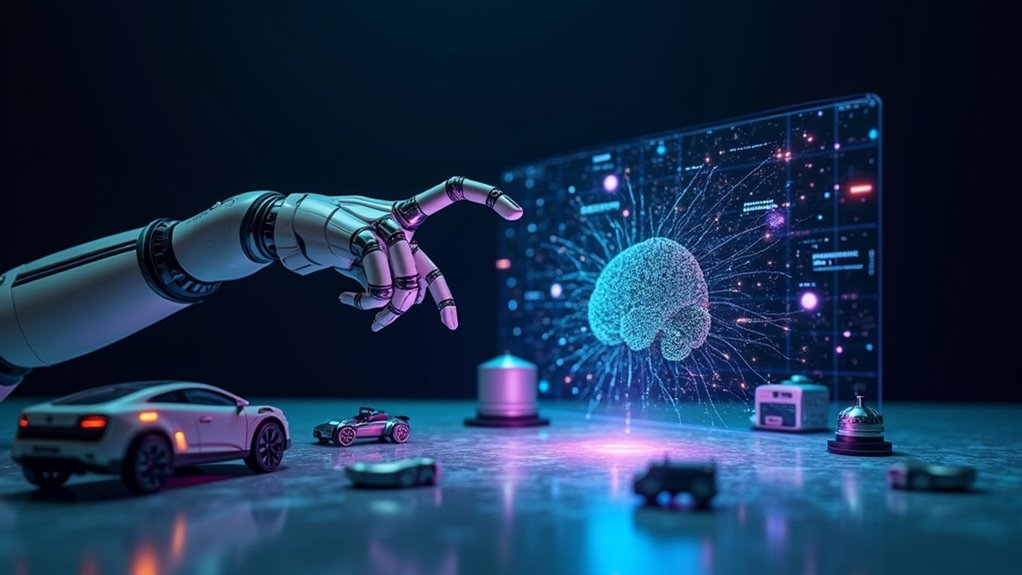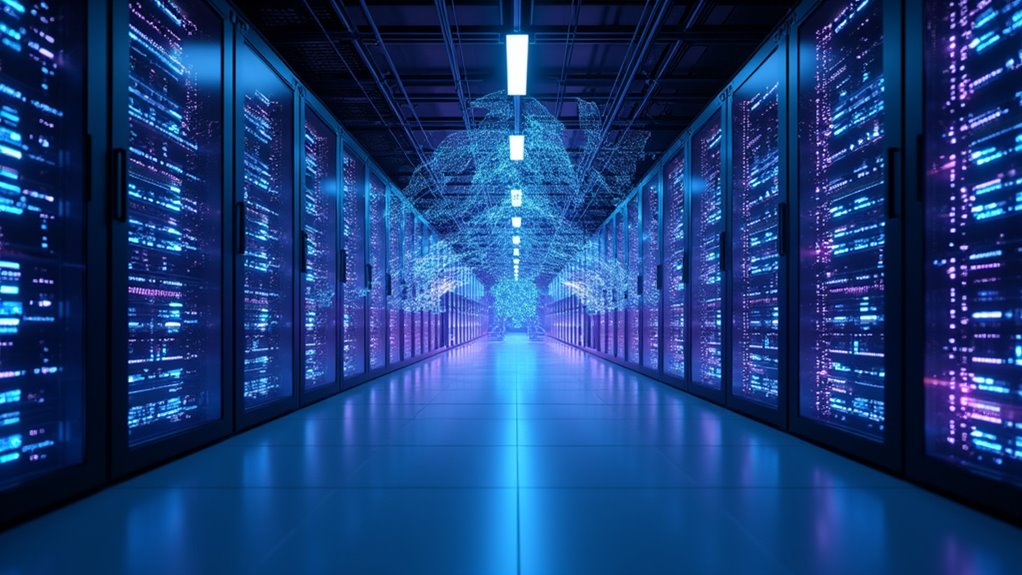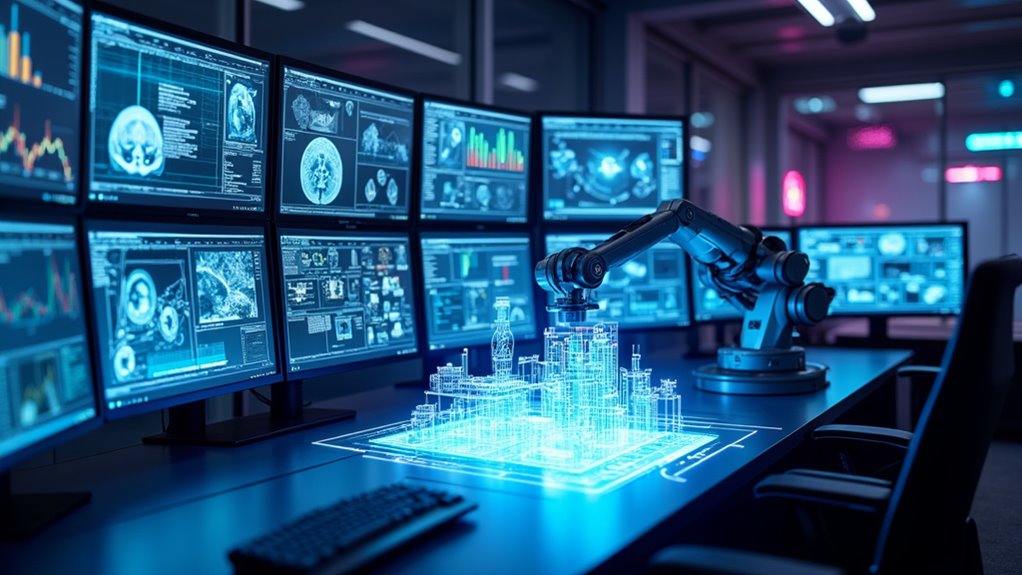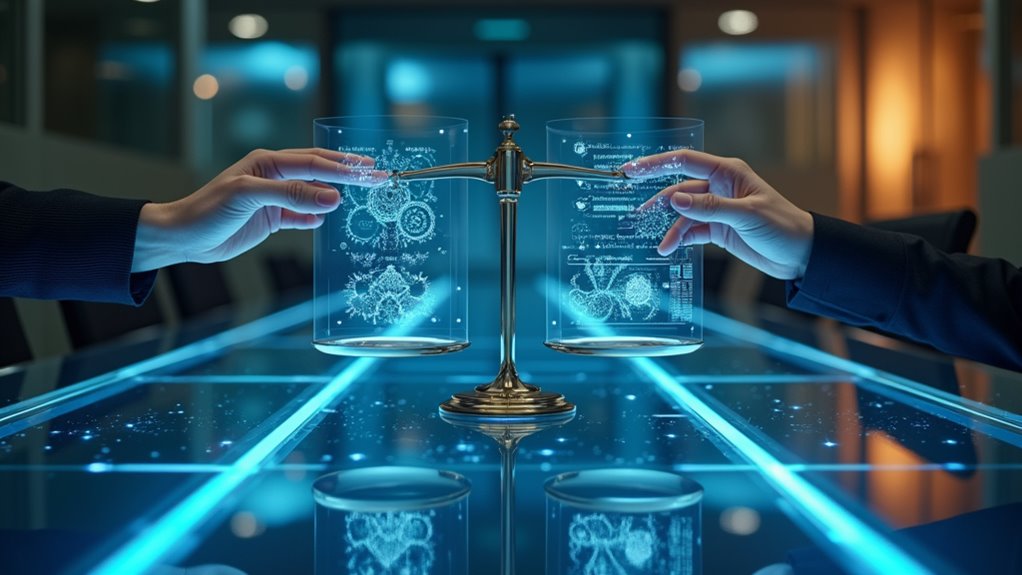Experts predict AGI could arrive sooner than you think. The median estimate sits around 2030, with optimistic researchers pointing to 2026-2027. Google DeepMind’s CEO suggests human-equivalent AI within 5-10 years, while broader surveys extend the timeline to 2047. Recent breakthroughs have shifted conversations from “if” to “when,” compressing previous 2060s estimates dramatically. Scaling laws, quantum computing, and neural network advances are accelerating the countdown. The remaining obstacles might surprise you.

While experts have long debated when artificial general intelligence might arrive, recent breakthroughs have dramatically shifted the conversation from “if” to “when.” The timeline for AGI—machines with human-level cognitive abilities across all domains—has compressed from distant centuries to mere decades, or possibly even years.
Future predictions about AGI have converged around 2030 as the median estimate, a startling acceleration from previous timelines that placed it in the 2060s. According to community forecasts, the median prediction is 2030, with the lower quartile at 2027 and upper quartile at 2038. Technological advancements, particularly in transformer models and deep learning, have shattered old assumptions. Remember when AI couldn’t beat humans at Go? That seems quaint now, doesn’t it?
The timeline for AGI has collapsed from a distant future to our doorstep, making yesterday’s AI limitations look embarrassingly primitive.
The scaling hypothesis has gained substantial credibility—throw more computing power at the problem and, surprise, your AI gets smarter! OpenAI’s research on scaling laws confirms this uncomfortable truth. Some bold researchers even suggest 2026 or 2027 as realistic targets for first-generation AGI. That’s not just optimistic; it’s potentially terrifying.
Not everyone agrees, of course. Skeptics point to fundamental challenges in reasoning, causality, and common sense that today’s systems still struggle with. Can a language model truly understand the world without experiencing it? Don’t hold your breath. Unlike today’s narrow AI systems, true AGI would demonstrate adaptability across multiple domains without specialized training for each task.
Mid-term predictions indicate significant strides towards AGI-like capabilities could occur within a 5 to 20 year timeframe as research focuses on reinforcement learning and neural networks. Your car will drive itself, your virtual assistant will actually be helpful, and your doctor might consult an AI before diagnosing you.
Google DeepMind’s CEO suggests human-equivalent AI might emerge within 5-10 years, while a survey of 2,778 experts produced wildly varying estimates. The long-term projections extend to 2047 and beyond, with a 50% chance of high-level machine intelligence by then.
Quantum computing looms as a potential game-changer that could accelerate this timeline even further. The journey from narrow AI to AGI to superintelligence remains complex, but one thing is clear: the clock is ticking faster than we thought.
Frequently Asked Questions
How Will AGI Impact Employment and Job Security?
AGI will trigger massive job displacement across industries—no one’s immune.
Routine tasks? Gone. Complex analysis? Delegated to algorithms.
The workforce transformation will require humans to develop uniquely “human” skills that machines can’t replicate. Creative thinking, emotional intelligence, and ethical judgment become premium assets.
Companies will shed traditional roles while creating entirely new job categories.
The employment landscape won’t just change—it’ll be unrecognizable. Prepare now or perish professionally, folks.
What Ethical Guidelines Should Govern AGI Development?
Ethical frameworks for AGI development must balance innovation with moral responsibility.
Developers can’t just shrug and say, “Oops, my algorithm did it!” Robust guidelines should enforce transparency (no mysterious black-box decisions), accountability (someone’s gotta answer when things go sideways), and fairness (algorithms shouldn’t perpetuate existing biases).
Human dignity and privacy protection aren’t optional extras—they’re non-negotiable requirements.
Could AGI Development Be Weaponized by Malicious Actors?
AGI development absolutely faces weaponization risks from malicious actors.
These individuals could exploit AGI systems for cyberattacks, autonomous weapons, or mass manipulation campaigns. The dual-use nature of AGI research means seemingly benign advances can be repurposed for harmful ends.
Without robust safeguards, weaponized technology could emerge with devastating capabilities beyond human control.
International cooperation is essential, but the current regulatory landscape remains woefully inadequate to prevent determined bad actors from weaponizing advanced AI systems.
Will AGI Have Consciousness or Subjective Experiences?
Whether AGI will have conscious awareness remains deeply uncertain. Current AI systems lack subjective perception entirely – they process information without “experiencing” it.
Most experts believe consciousness requires specific biological structures, though some theorize it could emerge from sufficient complexity.
The question isn’t just technical but philosophical: we don’t fully understand our own consciousness, making it challenging to determine if a machine’s internal states would constitute genuine experience rather than mere simulation.
How Might AGI Affect Global Power Dynamics Between Nations?
AGI will dramatically reshape global power dynamics through technological superiority.
Nations that develop AGI first will experience massive power shifts, gaining advantages in military capabilities, economic growth, and strategic dominance.
Think nuclear weapons, but smarter and less explode-y.
Countries will form new alliances based on AI access, while those left behind face digital colonization.
The stakes? Nothing less than a complete reordering of international influence, with tech giants potentially rivaling traditional nation-states for global authority.









